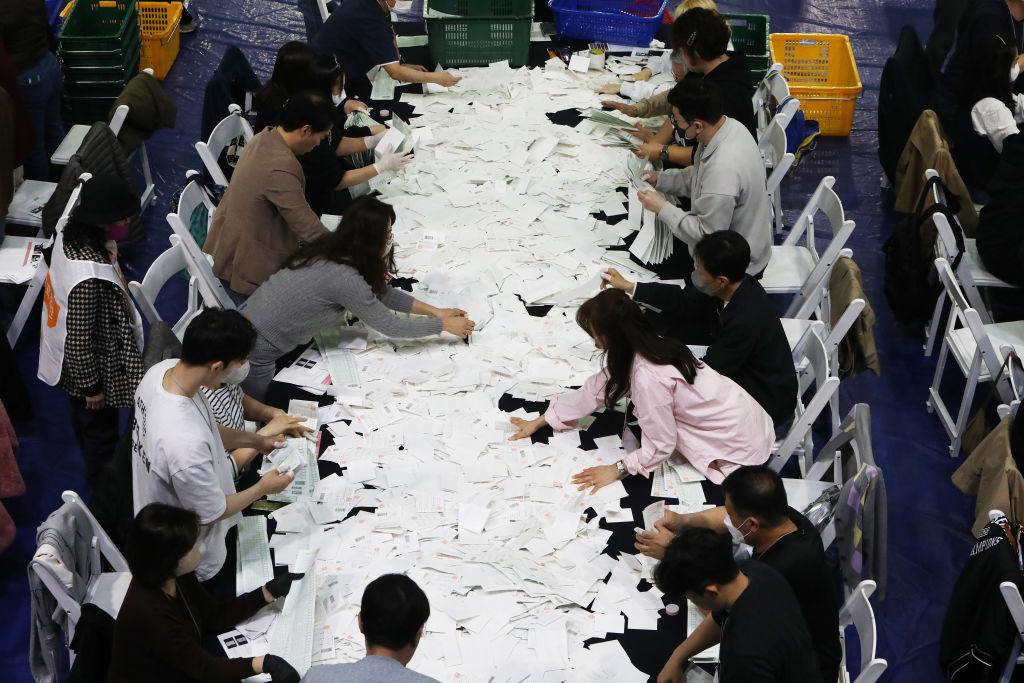SEOUL, South Korea — South Korea’s liberal opposition parties were expected to win a landslide victory in Wednesday’s parliamentary election, initial exit polls suggested, a result that if confirmed would make conservative President Yoon Suk Yeol a lame duck for his remaining three years in office.
The joint exit polls by South Korea’s three major TV stations – KBS, MBC and SBS – showed the main opposition Democratic Party and its satellite party were forecast to win combined 178-197 seats in the 300-member National Assembly. They expected another new liberal opposition party to win 12-14 seats.
The polls suggested the ruling People Power Party and its satellite party were projected to win 85-105 seats.
Wednesday’s election was widely seen as a mid-term confidence vote on President Yoon, a former top prosecutor who took office in 2022 for a single five-year term. He has been grappling with low approval ratings and a liberal opposition-controlled parliament that has limited his major policy platforms.
Read More: The Ultimate Election Year: All the Elections Around the World in 2024
Regardless of the results, Yoon will stay in power and his major foreign policy platforms will likely unchanged. But the ruling party’s big election defeat could set back Yoon’s domestic agenda and leave him facing intensifying political offensive by his liberal opponents.
“We did our best to do politics that follow public sentiments, but results of exit polls are disappointing,” ruling party Han Dong-hoon said in televised comments. “We’ll watch ballot counting to the end.”
After looking at TV broadcasts showing results of the exit polls together, Democratic Party members cheered and clapped their hands. “We’ll humbly watch the people’s choices to the end. Thanks much!” party leader Lee Jae-myung told reporters.
Of the 300 seats, 254 will be elected through direct votes in local districts, and the other 46 to the parties according to their proportion of the vote. Election observers earlier said candidates in about 50 to 55 local districts were in neck-and-neck races.
In the months ahead of the election, the conservatives and their liberal rivals exchanged toxic rhetoric and mudslinging. Their mutual contempt deepened during the 2022 presidential election, during which Yoon and Lee, then the Democratic Party candidate, spent months demonizing each other. Yoon eventually beat Lee by the narrowest margin ever for a Korean presidential candidate.
Lee is now a harsh critic of Yoon’s policies and is eying another presidential bid. His main potential conservative rival in the next presidential race is Han, an ally of Yoon who served as his justice minister. Lee faces an array of corruption investigations that he argues are politically motivated and pushed by by Yoon’s government.
There was a brief soul-searching about South Korea’s divisive politics after Lee was stabbed in the neck in January by a man who, according to police, tried to kill Lee to prevent him from becoming president. But as the parliamentary election approached, the rival parties began churning out abusive rhetoric and crude insults against each other.
During the election campaigning, Han called Lee “a criminal” and labeled his past comments as “trash.” Lee’s party spokesperson described Han’s mouth as a “trash bin.” Han accused Lee of using a sexist remark against a female ruling party candidate.
Chung Jin-young, a former dean of the Graduate School of Pan-Pacific International Studies at Kyung Hee University, predicted that the opposition parties could win a combined 150-180 seats.
“That would cause a political deadlock for the Republic of Korea for the next three years, as both the ruling and opposition parties can’t pursue things unilaterally and won’t likely make terms with each other,” Chung said.
Earlier this year, Yoon saw rising approval ratings over his strong push to drastically increase the number of medical students despite vehement protests by incumbent doctors. Yoon has said he aims to create more doctors to brace for the country’s rapidly aging population, but thousands of young doctors have gone on strike, saying that schools can’t handle an abrupt increase in students.
The doctors’ walkouts eventually left Yoon facing growing calls to find a compromise, with patients and others experiencing delays of surgeries and other inconveniences. Yoon’s ruling party is also struggling with rising prices of agricultural products and other goods and criticism of Yoon’s personnel management style.
“President Yoon has said a priority would be given to stabilizing prices and livelihoods, but they weren’t stabilized, so I think that will be a big negative for the Yoon government during the election,” Kim Daye, a 32-year-old Seoul resident, said.
— Associated Press writer Jiwon Song contributed to this report.
